Related Research Articles

Carousel is the second musical by the team of Richard Rodgers (music) and Oscar Hammerstein II. The 1945 work was adapted from Ferenc Molnár's 1909 play Liliom, transplanting its Budapest setting to the Maine coastline. The story revolves around carousel barker Billy Bigelow, whose romance with millworker Julie Jordan comes at the price of both their jobs. He participates in a robbery to provide for Julie and their unborn child; after it goes tragically wrong, he is given a chance to make things right. A secondary plot line deals with millworker Carrie Pipperidge and her romance with ambitious fisherman Enoch Snow. The show includes the songs "If I Loved You", "June Is Bustin' Out All Over" and "You'll Never Walk Alone". Richard Rodgers later wrote that Carousel was his favorite of all his musicals.
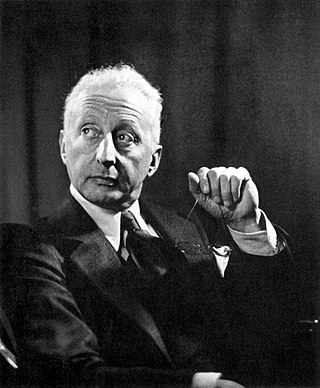
Jerome David Kern was an American composer of musical theatre and popular music. One of the most important American theatre composers of the early 20th century, he wrote more than 700 songs, used in over 100 stage works, including such classics as "Ol' Man River", "Can't Help Lovin' Dat Man", "A Fine Romance", "Smoke Gets in Your Eyes", "The Song Is You", "All the Things You Are", "The Way You Look Tonight" and "Long Ago ". He collaborated with many of the leading librettists and lyricists of his era, including George Grossmith Jr., Guy Bolton, P. G. Wodehouse, Otto Harbach, Oscar Hammerstein II, Dorothy Fields, Johnny Mercer, Ira Gershwin and Yip Harburg.

Oscar Greeley Clendenning Hammerstein II was an American lyricist, librettist, theatrical producer, and director in musical theater for nearly 40 years. He won eight Tony Awards and two Academy Awards for Best Original Song. Many of his songs are standard repertoire for vocalists and jazz musicians. He co-wrote 850 songs.

The Sound of Music is a musical with music by Richard Rodgers, lyrics by Oscar Hammerstein II, and a book by Howard Lindsay and Russel Crouse. It is based on the 1949 memoir of Maria von Trapp, The Story of the Trapp Family Singers. Set in Austria on the eve of the Anschluss in 1938, the musical tells the story of Maria, who takes a job as governess to a large family while she decides whether to become a nun. She falls in love with the children, and eventually their widowed father, Captain von Trapp. He is ordered to accept a commission in the German Navy, but he opposes the Nazis. He and Maria decide on a plan to flee Austria with the children. Many songs from the musical have become standards, including "Do-Re-Mi", "My Favorite Things", "Edelweiss", "Climb Ev'ry Mountain", and the title song "The Sound of Music".

Lorenz Milton Hart was an American lyricist and half of the Broadway songwriting team Rodgers and Hart. Some of his more famous lyrics include "Blue Moon"; "The Lady Is a Tramp"; "Manhattan"; "Bewitched, Bothered and Bewildered"; and "My Funny Valentine".
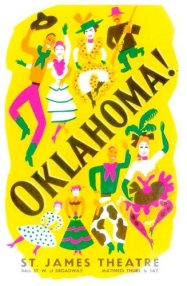
Oklahoma! is the first musical written by the duo of Rodgers and Hammerstein. The musical is based on Lynn Riggs's 1931 play, Green Grow the Lilacs. Set in farm country outside the town of Claremore, Indian Territory, in 1906, it tells the story of farm girl Laurey Williams and her courtship by two rival suitors, cowboy Curly McLain and the sinister and frightening farmhand Jud Fry. A secondary romance concerns cowboy Will Parker and his flirtatious fiancée, Ado Annie.
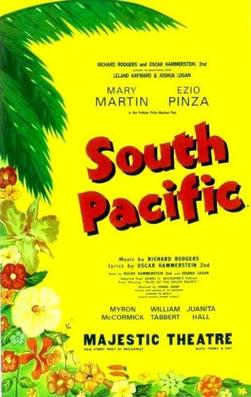
South Pacific is a musical composed by Richard Rodgers, with lyrics by Oscar Hammerstein II and book by Hammerstein and Joshua Logan. The work premiered in 1949 on Broadway and was an immediate hit, running for 1,925 performances. The plot is based on James A. Michener's Pulitzer Prize–winning 1947 book Tales of the South Pacific and combines elements of several of those stories. Rodgers and Hammerstein believed they could write a musical based on Michener's work that would be financially successful and, at the same time, send a strong progressive message on racism.

Rodgers and Hammerstein was a theater-writing team of composer Richard Rodgers (1902–1979) and lyricist-dramatist Oscar Hammerstein II (1895–1960), who together created a series of innovative and influential American musicals. Their musical theater writing partnership has been called the greatest of the 20th century.

Flower Drum Song was the eighth musical by the team of Rodgers and Hammerstein. It is based on the 1957 novel, The Flower Drum Song, by Chinese-American author C. Y. Lee. It premiered on Broadway in 1958 and was then performed in the West End and on tour. It was adapted for a 1961 musical film.

"Edelweiss" is a show tune from the 1959 Rodgers and Hammerstein musical The Sound of Music. It is named after the edelweiss, a white flower found high in the Alps. The song was created for the 1959 Broadway production of The Sound of Music, as a song for the character Captain Georg von Trapp. In the stage musical and its 1965 film adaptation, Captain von Trapp and his family sing this song during the concert near the end of Act II, as well as a statement of Austrian patriotism in the face of the pressure put upon him to join the navy of Nazi Germany following the Anschluss. It is also Captain von Trapp's subliminal goodbye to his beloved homeland, using the flower as a symbol of his loyalty to Austria. In the film version, the song is additionally sung by the Captain earlier in the film when he rediscovers music with his children.

The Trapp Family was a singing group formed from the family of former Austrian naval commander Georg von Trapp. The family achieved fame in their original singing career in their native Austria during the interwar period. They also performed in the United States before immigrating there permanently to escape the deteriorating situation in Austria leading up to World War II. In the United States, they became well known as the "Trapp Family Singers" until they ceased to perform as a unit in 1957. The family's story later served as the basis for a memoir, two German films, and the Rodgers and Hammerstein Broadway musical The Sound of Music. The last surviving of the original seven, Maria Franziska, died in 2014 at the age of 99. The youngest and last surviving member of the Trapp Family Singers is Johannes von Trapp.

Me and Juliet is a musical with music by Richard Rodgers, and lyrics and book by Oscar Hammerstein II. The sixth stage collaboration by Rodgers & Hammerstein, it tells a story of romance backstage at a long-running musical: assistant stage manager Larry woos chorus girl Jeanie behind the back of her electrician boyfriend, Bob. Me and Juliet premiered in 1953 and was considered a modest success — it ran for much of a year on Broadway and had a limited run in Chicago, and returned a small profit to its backers.
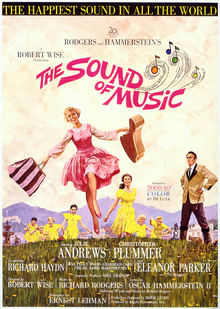
The Sound of Music is a 1965 American musical drama film produced and directed by Robert Wise from a screenplay written by Ernest Lehman, and starring Julie Andrews and Christopher Plummer, with Richard Haydn, Peggy Wood, Charmian Carr, and Eleanor Parker. The film is an adaptation of the 1959 stage musical composed by Richard Rodgers, with lyrics by Oscar Hammerstein II and a book by Lindsay and Crouse. It is based on the 1949 memoir The Story of the Trapp Family Singers by Maria von Trapp and is set in Salzburg, Austria. It is a fictional retelling of her experiences as governess to seven children, her eventual marriage with their father Captain Georg von Trapp, and their escape during the Anschluss in 1938.

Pipe Dream is the seventh musical by the team of Richard Rodgers and Oscar Hammerstein II; it premiered on Broadway on November 30, 1955. The work is based on John Steinbeck's novel Sweet Thursday—Steinbeck wrote the novel, a sequel to Cannery Row, in the hope of having it adapted into a musical. Set in Monterey, California, the musical tells the story of the romance between Doc, a marine biologist, and Suzy, who in the novel is a prostitute; her profession is only alluded to in the stage work. Pipe Dream was not an outright flop but was a financial disaster for Rodgers and Hammerstein.
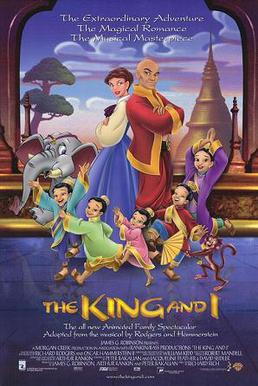
The King and I is a 1999 American animated musical film directed by Richard Rich. As of February 2024, it is the only animated feature film produced by Morgan Creek Entertainment. Loosely based on Richard Rodgers and Oscar Hammerstein II's 1951 stage musical of the same name, it portrays a fictionalized account of English school teacher Anna Leonowens' historical encounter with king Mongkut of Siam and the royal court. The voice cast stars Miranda Richardson and Martin Vidnovic as Leonowens and Mongkut, respectively, with Ian Richardson, Darrell Hammond, and Adam Wylie. The score, songs, and some of the character names come from the stage musical. Screenwriters Peter Bakalian, Jacqueline Feather, and David Seidler took creative liberties with the history and with the source material from the musical in an attempt to make the film palatable to all audiences.
"The Lonely Goatherd" is a popular show tune from the 1959 Rodgers and Hammerstein musical The Sound of Music.
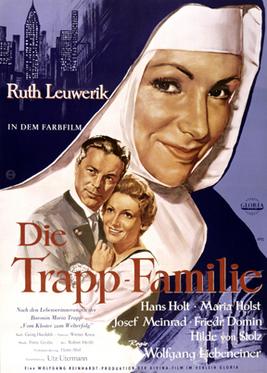
The Trapp Family is a 1956 West German comedy drama film about the real-life Austrian musical family of that name directed by Wolfgang Liebeneiner and starring Ruth Leuwerik, Hans Holt, and Maria Holst. Based on Maria von Trapp's 1949 memoir, The Story of the Trapp Family Singers, the film is about a novice nun sent to care for the unruly children of a wealthy baron, who falls in love with and marries the young woman. Through her caring influence, the family becomes a famous singing group. When the baron is pressured to join Hitler's navy, the family escapes to the United States, where they establish themselves as singers.
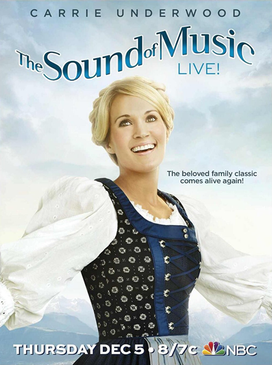
The Sound of Music Live! is an American television special that was originally broadcast by NBC on December 5, 2013. Directed by Rob Ashford and Beth McCarthy-Miller, produced by Craig Zadan and Neil Meron, and written by Austin Winsberg, the special was an adaptation of Rodgers and Hammerstein's 1959 Broadway musical The Sound of Music. The television special starred country singer and American Idol winner Carrie Underwood as Maria von Trapp, and was performed and televised live from Grumman Studios in Bethpage, New York.
"Something Good" is a song written by Richard Rodgers for the 1965 film version of the 1959 stage musical The Sound of Music. It replaced the original song sung by Maria and Captain Georg von Trapp called "An Ordinary Couple". Since then the song has been used in the various reproductions of the play and most recently the 2015 television special, The Sound of Music Live.
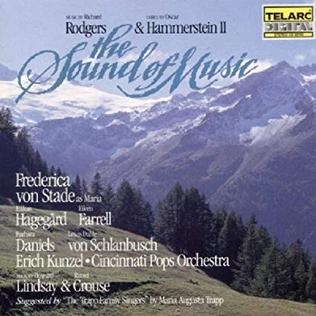
The Sound of Music is a 70-minute studio album of Richard Rodgers's and Oscar Hammerstein's 1959 musical, starring Frederica von Stade, Håkan Hagegård and Eileen Farrell, performed with the Cincinnati Pops Orchestra under the direction of Erich Kunzel. It was released in 1988.
References
- ↑ Brantley, Ben (2000). The New York Times Theater Reviews 1997-1998. The New York Times Book Co., Inc. p. 244. ISBN 9780815333418 . Retrieved July 14, 2012.
- 1 2 Knapp, Raymond (2005). The American Musical and the Formation of National Identity . Princeton University Press. pp. 244. ISBN 9780691118642 . Retrieved July 14, 2012.
no way to stop it sound of music.
- ↑ Miletich, Leo N. (1993). Broadway's Prize-Winning Musicals: An Annotated Guide for Libraries and Audio Collectors . The Haworth Press, Inc. pp. 35. ISBN 9781560242888 . Retrieved July 15, 2012.
no way to stop it sound of music.
- ↑ Wolf, Stacy Ellen (2002). A Problem Like Maria: Gender and Sexuality in the American Musical. The University of Michigan Press. p. 219. ISBN 9780472067725 . Retrieved July 14, 2012.
- ↑ Hischak, Thomas S. (2007). The Rodgers and Hammerstein Encyclopedia. Greenwood Press. p. 259. ISBN 9780313341403 . Retrieved July 14, 2012.
- ↑ Hischak, Thomas S. (2004). Through the Screen Door: What Happened to the Broadway Musical When It Went to Hollywood. Scarecrow Press, Inc. p. 158. ISBN 9780810850187 . Retrieved July 15, 2012.
- 1 2 Lewis, David H. (2002). Broadway Musicals: A Hundred Year History. McFarland & Company, Inc., Publishers. p. 70. ISBN 9780786481149 . Retrieved July 14, 2012.
- ↑ Hischak, Thomas S. (2008). The Oxford Companion to the American Musical: Theatre, Film, and Television. Oxford University Press. p. 696. ISBN 9780195335330 . Retrieved July 14, 2012.
- ↑ Wolf, Stacy Ellen (2002). A Problem Like Maria: Gender and Sexuality in the American Musical. The University of Michigan Press. p. 227. ISBN 9780472067725 . Retrieved July 14, 2012.
- ↑ Don B. Wilmeth, Tice L. Miller (1996). Cambridge Guide to American Theatre . Cambridge University Press. pp. 360. ISBN 9780521564441 . Retrieved July 14, 2012.